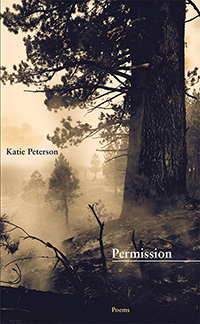The composer Ned Rorem defined an artwork “as the result of a marriage of true minds; the minds are within one individual, and so is the marriage, which, before being consummated, causes many a beautiful dish to be broken.” Marriage is a form that accommodates both tension and truce. The reader of Katie Peterson’s poems in Permission is a houseguest caught in the marital crossfire where diminished expectations clash and sometimes mesh with the grandeurs of desire.
 Robert Duncan, whose poem title “Often I Am Permitted to Return to a Meadow” provides the epigraph, celebrated Charles Olson for turning the art of poetry “from personal use and misuse toward a new life,” and rejecting the personal anecdote “for large spatial architectures at the edge of the chaos … that-which-had-been-buried.” In Peterson’s work, too, the personal is suspect – but not quite dismissed. Where Duncan assumed in advance that his life was an allegory in which ordinary events yielded mythic significance, Peterson pulls off the more rigorous and dubious task of demanding proof while enacting it in the very movement of speech, even as she portrays herself as a biological disappointment. But in the poem’s astonishing instance, permission is both pointedly demanded and lavishly granted.
Robert Duncan, whose poem title “Often I Am Permitted to Return to a Meadow” provides the epigraph, celebrated Charles Olson for turning the art of poetry “from personal use and misuse toward a new life,” and rejecting the personal anecdote “for large spatial architectures at the edge of the chaos … that-which-had-been-buried.” In Peterson’s work, too, the personal is suspect – but not quite dismissed. Where Duncan assumed in advance that his life was an allegory in which ordinary events yielded mythic significance, Peterson pulls off the more rigorous and dubious task of demanding proof while enacting it in the very movement of speech, even as she portrays herself as a biological disappointment. But in the poem’s astonishing instance, permission is both pointedly demanded and lavishly granted.
A bundle of oppositions, troubled and picked over, occasions the speaking. The sparks fly from the grating of revel on rue, discovery on disavowal, decisiveness on doubtfulness, capacity on inadequacy. These terms of restless struggle become familiar early in Permission, Peterson’s second book. But hovering over the fray is a single, unmistakable and immovable stipulation – a person reserves the right to strange reverie: “If there / was ever knowledge in me, I let it go …” Milan Kundera said, “A poet who serves any truth other than the truth to be discovered (which is a dazzlement) is a false poet.” Here and there, Peterson may state containable truths about our fallen or inadequate or deluded nature, but she writes as one dazzled by discoveries in her actual situation.
She is a poet of necessary disequilibrium. With stubborn persistence, each poem struggles for balance, usually resulting in a draw between the limitations of personal comprehension and a vast naturalness of automatic being in the surround, often depicted in minutiae. A yearning for expansion of spirit ends up (almost) settling for the yearning itself. Remarkably, her poem-endings often echo this compromise yet strike the reader as quite various in what they notice or their manner of insistence.
THE SUN’S PUNISHMENT
There’s no one running
in the ash light of morning this morning.
Sometimes down the path
to the dairy, a person
will, not out of bravery,
though that is what it looks like
against these mountains.
I was sick of looking
for the monarch anyway.
My monarch
always
the monarch of next year,
meaning,
the one I want not the one I get.
Next year lengthening
in the mind. It gets closer.
Dickinson, half her life
over, knew she was
somewhat closer
to eternity.
No longer saw herself
as a speck upon a ball,
hungry all the years,
the slightest in the house.
Soon would cease
to see herself at all.
Memory of somewhere else:
Flat blue even in morning
against the facades of pink
and white frosting: all of it
asking the eyes for so much
at the start of the day.
The little bridge over Fontanka
marking the halfway
of the walk to school.
How I hate halfways.
They’re just hallways
hiding the absolute.
Ash-light of morning,
news on the ranch is poor:
less than half the herd
will give birth, it’s a problem
of feed. If the sun’s
punishment is scarcity,
let me have it.
If it’s proliferation, let it come.
Dickinson dreams:
in hers, the figures
don’t need
to come to life: no circumference.
Seeking silence as a form of fortune.
For the fortunate,
form follows what you are.
The rest of us have to seek.
 Certainly, form follows (or embodies) what or how the speaker is in this poem – even as the final line disavows such achievement. In “Strange Litany” (I) she writes, “If it’s true about humility, / that it’s wanting / to hold forth / without exerting force / I want it anyway, want it worse / than a case of liquor / made from the color / of the wing of the monarch.” But the element of humility in these poems does exert force. Addressing the monarch in “Strange Litany” (II), she writes, “Teach me / to hold still.” But the flitting litheness of mind is everything here. She knows, as spoken in “At the Window,” that “Not beauty but eloquence / gets me through the difficult / day” – and then wishes to be like a garden which becomes “an explanation / that refuses in all its deep intelligence / to criticize or chasten.”
Certainly, form follows (or embodies) what or how the speaker is in this poem – even as the final line disavows such achievement. In “Strange Litany” (I) she writes, “If it’s true about humility, / that it’s wanting / to hold forth / without exerting force / I want it anyway, want it worse / than a case of liquor / made from the color / of the wing of the monarch.” But the element of humility in these poems does exert force. Addressing the monarch in “Strange Litany” (II), she writes, “Teach me / to hold still.” But the flitting litheness of mind is everything here. She knows, as spoken in “At the Window,” that “Not beauty but eloquence / gets me through the difficult / day” – and then wishes to be like a garden which becomes “an explanation / that refuses in all its deep intelligence / to criticize or chasten.”
The disquiet is mainly a matter of action and statement rather than staged attitude. As a poet invested in potentiality rather than personality, Peterson is more attuned to pitch than to tone. Below, the fourth stanza of “Meditation Denying Everything” exemplifies a typical Peterson gesture – a glimpse of the non-human inciting desire for “other worlds,” shaded by questions inspired by that wish. (The poem is included in its entirety at the end of this essay):
The pattern of the air around that leaf
is like someone tracing my ribcage
with his index finger
and then walking away.
Who can blame us for wanting other worlds,
but shall we take them,
or let them come to us? Is the spirit just an ear
more like a mouth
that bites the air and turns it into blood?
Duncan’s mythy-ness persists in “Continental Divide” – but Peterson takes it up with a sharper edge as one “deluded” into personhood, foraging in “the forest of archetype.” At the same time (and as she notes, there has only ever been one moment of time), the Edenic people remain unfallen. The totality of oppositions is the world of Permission where transcendence and falling-flat-on-your-face may seem equally imminent.
CONTINENTAL DIVIDE
Yes you saw the story
shine in me, wicked in that.
The girl having never touched
herself or even really
thought about it, astride
a rusty shape like a horse.
Exit into the forest of archetype:
then I knew shapes
had been deluded into persons,
and I was one of them.
In the garden-world of origins,
we have no tools.
The summer garden even
fallen into disarray: the trellis
fallen with its leaves
in a state of dry decay.
I miss the morning most
in the evening, said Eve, her golden
hair in curls before
she had a word for curls.
I miss the morning most
the next morning, Adam said.
Their tears ran
opposite directions after that.
But, look, they’re still moving
in the garden as we speak! See,
the world, it turns out,
has only ever been one day long.
They had no time
for evil or philosophy.
In the spot beside the river,
in the aspen grove,
in the shade of the pear tree,
which would need an autumn
it would never get
to bear fruit: no guilt
about some harvest
unharvestable as yet, he stands up
inside her and she comes until one word
is right behind her teeth,
which becomes the last and first
one anyone ever says.
In “Conversation” she writes, “how much I’d like / to become something else” – yet in the context of the poem, it does not sound like self-disgust. In “Suture” she says, “I’m tired of being / a body or a mind” – but the poem is built from tensile sinew. I don’t mean to say one shouldn’t believe such things. It is simply that the workings of this unsettled mind create cerebral stand-offs that may be negotiated only through the physicality of the language. Peterson is a poet whose generosity lies in giving the reader something to do — to register the successive jolts and calms of comprehension. This is active writing that refuses to flatter a reader’s easier inclinations: “Language welling / up from an earth closer / than ever to remote.”
 To emphasize the turbulence in the work, however, is to scant the poems’ reticence, sometimes testy, sometimes uncertain. There is something onerous about “Love / indistinguishable from need / from one moment / to the next. Hard to live / that way, I bet. Love (to me) always an excess.” The person in these poems reflects very little credit on herself, doesn’t seek to win favor through comeliness of character, and likes a certain severity in transactions. But her fretting is endearing: “We worry, / I think, always taking / the measure of the task” (“Happiness”). I recall Duncan’s essay, “A Critical Difference of View,” in which he takes Hayden Carruth to task for considering “William Carlos Williams’ articulation of the line of poetry to be a device of an idiosyncratic style or signature — a matter then of personal property or copyright.” Peterson preserves Duncan’s love of the poem as an open field — but she won’t disavow the actualities of idiosyncrasy. On the contrary, she has made a subtle art out of them.
To emphasize the turbulence in the work, however, is to scant the poems’ reticence, sometimes testy, sometimes uncertain. There is something onerous about “Love / indistinguishable from need / from one moment / to the next. Hard to live / that way, I bet. Love (to me) always an excess.” The person in these poems reflects very little credit on herself, doesn’t seek to win favor through comeliness of character, and likes a certain severity in transactions. But her fretting is endearing: “We worry, / I think, always taking / the measure of the task” (“Happiness”). I recall Duncan’s essay, “A Critical Difference of View,” in which he takes Hayden Carruth to task for considering “William Carlos Williams’ articulation of the line of poetry to be a device of an idiosyncratic style or signature — a matter then of personal property or copyright.” Peterson preserves Duncan’s love of the poem as an open field — but she won’t disavow the actualities of idiosyncrasy. On the contrary, she has made a subtle art out of them.
Peterson’s stance also brings to mind another of her influences: Dickinson. “Each life converges to some Centre … Embodied scarcely to itself,” Dickinson wrote. And then concludes:
Ungained — it may be — by Life’s low Venture —
But then —
Eternity enable the endeavoring
Again.
You can hear Dickinson, and the pervasive sense of a “low venture” in our way of going about things, in Peterson’s “The Sun’s Punishment” (above) where she writes, “How I hate halfways. / They’re just hallways / hiding the absolute.” She is daring the reader to assess how he/she stands regarding half-measures – while we’re all standing in the hallways. She is granting permission to wonder and worry.
[Published by New Issues on September 16, 2013. 70 pages, $15.00 paperback]
* * * * * * * * *
MEDITATION DENYING EVERYTHING
Because it is a pearly evening
I am sitting in the window reading
a book I have read before.
Branches emphasize
their heft and sway over their shadows.
Some kind of extra firmament,
an ear over the earth’s ear,
extra, as language is to prayer.
Narratives of elsewhere: in the eye
inside my eye that vision makes when you tell it to
when you shut your eyes so hard they hurt
you get more vista and less twist
of road, and then you’re looking
at a valley you named yourself
and irrigated yourself,
full of bitterroot, magnolia in the clefts
of rock, sage, at last a harvest—
a desert that belongs to you–
The trick to renunciation is starting now.
The secret of detachment
is having already given up,
a transcript of speech whose cadences are lost,
the human need for a body to fill in
all your body’s deficiencies, those clefts and dents
already given up, the narrative of a life
completely altered in the retrospect
that knowledge brings and so discredited
the point of memory utterly lost.
That piece of land has always been
suitable for a house. That nest has never
been ready for eight baby birds
who, top-heavy, frightened their own branch
and home and scared themselves
completely and remarkably away.
Do you hear that? It’s the wind
negotiating the spine of one leaf
it cannot decide whether to raise
a fragment of an inch.
Duncan writes as a reader
struggles with a strong sentence, I struggle
at certain unmistakable times
with what’s furtive and most right.
When people marry they finish their names.
I am still listening for mine
to begin. My spine
wants a bicycle to order its work, a red
bicycle, a hill into a heart
of a city that holds something I want.
The pattern of the air around that leaf
is like someone tracing my ribcage
with his index finger
and then walking away.
Who can blame us for wanting other worlds,
but shall we take them,
or let them come to us? Is the spirit just an ear
more like a mouth
that bites the air and turns it into blood?
A voice in the next room goes to sleep.
Sleep moves in the branches of the oak
become a rootless mass
unsung by skeleton or name or height.
My friend who says
she does not believe in Paradise
believes in rest: I believe that,
or more likely I like to think of her,
the way she held my name in her small mouth,
as she held her own name. I like to think of anyone
who on a night like this
would reach towards my ribcage
and trace it delicately and walk away.